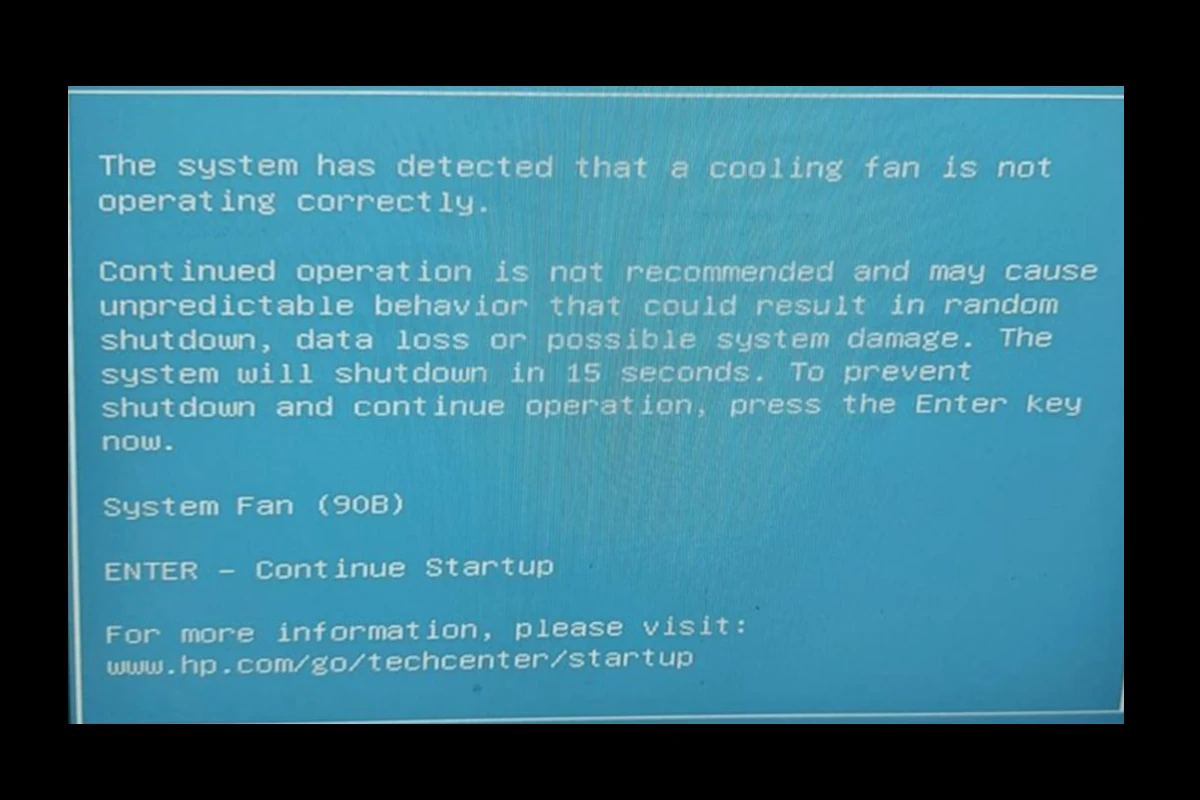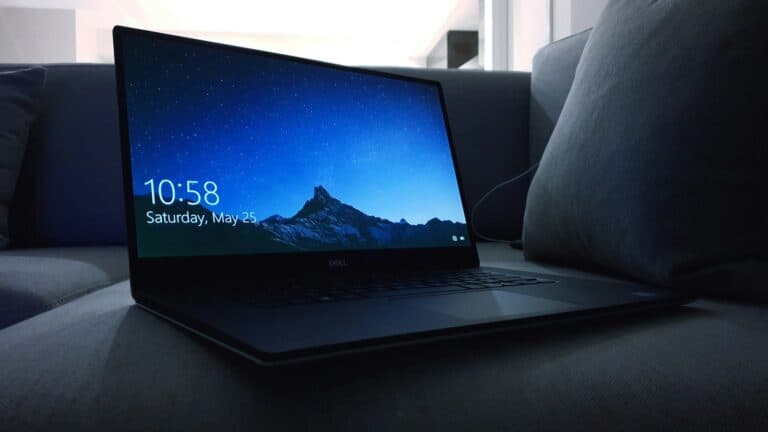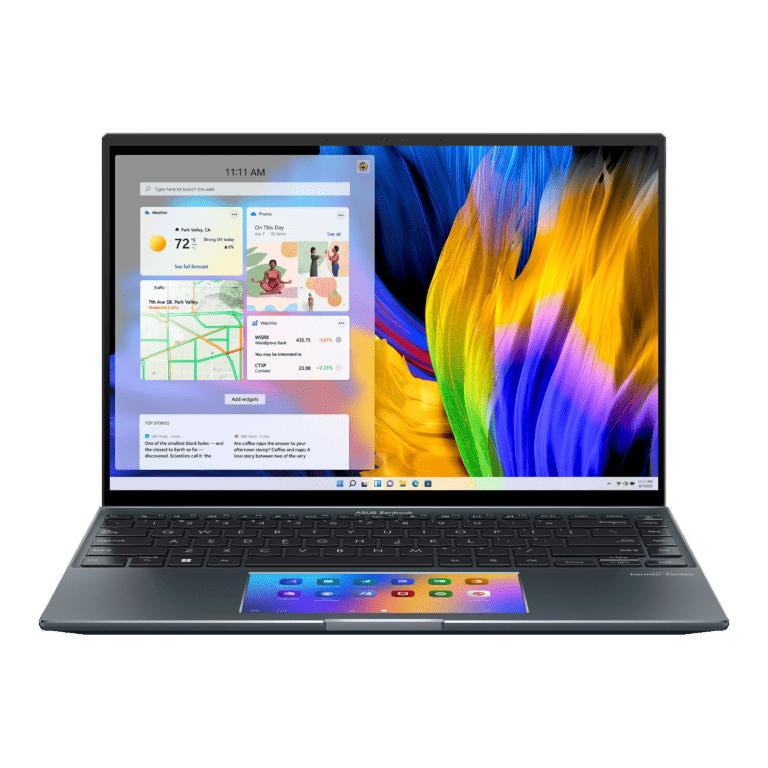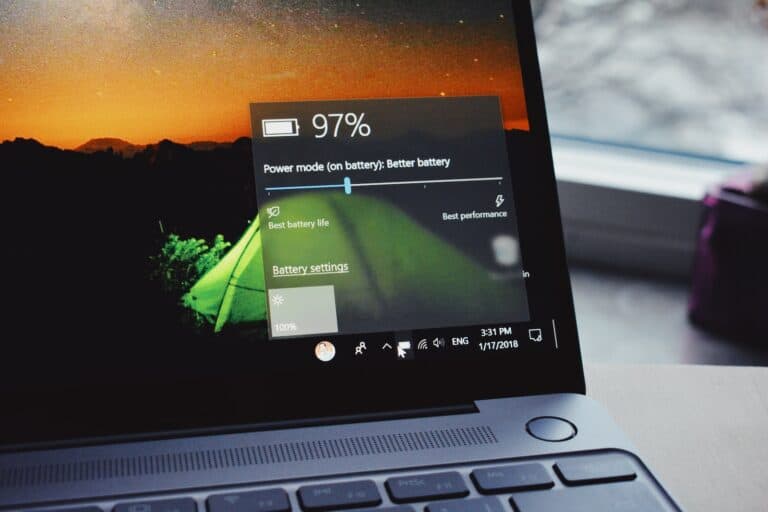If you see the message “The system has detected that a cooling fan is not operating correctly” on your HP computer, it’s important to take action. The cooling fan plays a crucial role in keeping your computer’s components at a safe temperature. If the fan malfunctions, it can lead to overheating, system crashes, and hardware damage.
First, listen for the fan to check if it’s running. You can also go into your computer’s BIOS settings to see if there are any error messages related to the fan. Sometimes, a simple system reboot can fix the issue, but if the fan is failing, it will need to be replaced. Neglecting this problem can lead to serious complications. Depending on the cause, fixing the problem may involve software solutions, physical repairs, or both. It’s important to address this issue promptly to prevent further complications.
Guide: Fixing “The System Has Detected That a Cooling Fan Is Not Operating Correctly”
This message usually appears when your computer’s BIOS detects that a cooling fan (CPU or system fan) is malfunctioning, disconnected, or spinning below the required speed. Since proper cooling is critical to prevent overheating, it’s important to address this promptly.
1. Understand the Warning
When you see this message, the system is telling you:
- A fan is not spinning at all, or
- A fan is spinning slower than expected, or
- The fan isn’t being detected by the motherboard.
If ignored, your computer could overheat, throttle performance, or even shut down unexpectedly.
2. Immediate Steps
- Don’t ignore it. Press F1 (or the key shown) to continue booting only if necessary.
- Shut down your PC if you hear loud grinding noises, rattling, or if the fan isn’t spinning at all.
3. Basic Troubleshooting
🔹 Step 1: Clean the Fans
- Power off your computer and unplug it.
- Open the case (desktop) or bottom panel (laptop).
- Use compressed air to blow out dust from fans, vents, and heatsinks.
- Make sure vents are not blocked.
🔹 Step 2: Check for Obstructions
- Ensure cables are not touching or blocking the fan blades.
- Confirm the fan spins freely when nudged.
🔹 Step 3: Verify Connections
- Check that the fan cable is securely connected to the correct motherboard header (e.g., CPU_FAN or SYS_FAN).
- Reseat the connector if loose.
4. Software Diagnostics
- Enter BIOS/UEFI (usually by pressing Esc, F2, F10, or Del at startup).
- Look for Hardware Monitor or Fan Speed settings.
- Confirm whether the fan is detected and its RPM is reported.
- If your BIOS supports it, run a Fan Test (HP laptops often have this in the Diagnostics menu).
5. When to Replace the Fan
Replace the fan if:
- It doesn’t spin at all when powered on.
- It makes grinding, clicking, or rattling noises.
- BIOS shows “0 RPM” for the fan consistently.
For desktops, you can easily replace the CPU or case fan with a compatible one.
For laptops, the fan may require ordering a specific replacement part for your model.
6. Advanced Options
- Update BIOS/UEFI: Sometimes fan detection issues are fixed in firmware updates.
- Thermal Paste Replacement: If the CPU overheats quickly, reapplying thermal paste may help.
- Professional Repair: If you’re not comfortable opening your PC, take it to a technician.
7. Preventing Future Fan Errors
- Keep your computer in a cool, dust-free environment.
- Use it on a hard, flat surface (avoid beds/couches for laptops).
- Clean fans and vents every 3–6 months.
- Monitor temperatures with tools like HWMonitor or Core Temp.
✅ Summary:
This error means your cooling system isn’t working properly. Start by cleaning and checking connections. If the fan is dead or noisy, replace it. Ignoring the problem risks overheating and permanent damage.
Troubleshooting and Resolving HP Cooling Fan Errors
Understanding the Error
When your HP computer displays the message “The system has detected that a cooling fan is not operating correctly,” it indicates a problem with the fan responsible for cooling the CPU (Central Processing Unit). This is crucial to prevent overheating, which can damage your system. Ignoring this error can lead to performance issues, sudden shutdowns, and even permanent hardware damage.
How to Fix the HP Cooling Fan Error: Step-by-Step Guide
| Step | Action | Notes |
|---|---|---|
| 1 | Restart Your Computer: Sometimes, a simple restart can resolve temporary glitches. | If the error persists, move to the next steps. |
| 2 | Check for Obstructions: Ensure that vents are clear of dust and debris, allowing for proper airflow. | Use compressed air to clean the vents carefully. |
| 3 | Update BIOS: Outdated BIOS can sometimes cause fan issues. Check for updates on the HP website. | Follow instructions carefully when updating BIOS, as incorrect procedures can cause further problems. |
| 4 | Update Drivers: Ensure your system drivers, especially chipset and thermal management drivers, are up-to-date. | Use HP Support Assistant or download drivers from the HP website. |
| 5 | Run Diagnostics: HP computers often have built-in diagnostics tools. Use them to test the fan’s functionality. | Refer to your user manual or the HP website for instructions on running diagnostics. |
| 6 | Check Power Settings: Ensure your power plan isn’t set to a mode that underpowers the fan. | Choose a balanced or high-performance plan. |
| 7 | Hard Reset (90b Error): | See below for specific instructions on performing a hard reset for error 90b. |
| 8 | Seek Professional Help: If the problem persists, consult an authorized HP technician. | They can diagnose and repair any hardware issues with the fan. |
How to Fix 90b Error (Hard Reset)
- Turn off your computer.
- Disconnect the power cord and remove the battery (if applicable).
- Press and hold the power button for 30 seconds.
- Reconnect the power cord and battery (if applicable).
- Turn on your computer.
Why HP CPU Fans Fail
Several factors can contribute to HP CPU fan failures:
- Dust Accumulation: Dust buildup restricts airflow and overloads the fan.
- Wear and Tear: Over time, the fan’s motor and bearings can wear out.
- Manufacturing Defects: Some fans may have inherent flaws.
- Overheating: Consistent high temperatures stress the fan.
- Physical Damage: Accidental drops or impacts can damage the fan.
Regular maintenance, such as cleaning the vents and ensuring proper ventilation, can help prolong the life of your HP CPU fan and prevent errors.
Important Note:
Always refer to your specific HP model’s user manual or the HP website for detailed instructions and troubleshooting guides.
Key Takeaways
- Cooling fan errors indicate potential overheating risks.
- A systematic approach is needed to diagnose fan problems.
- Remedial actions range from system reboots to fan replacement.
Diagnosing the Issue
When a laptop’s cooling fan stops working, it may display specific error messages and behave erratically. Prompt action is key to prevent damage. This error may show up in many forms like “System FAN ERROR 90B” or “HP Laptop Fan Error 90b”, etc.
Identifying Error Messages
Many laptops, including those from HP, have built-in diagnostics that alert users when there’s an issue with the system’s cooling fan. The error messages that commonly appear on screen might include “System Fan (90B)” or similar notifications. These messages signal that the fan isn’t operating as it should. If you see such a message, it’s a clear sign that your laptop needs attention. It’s crucial to note the exact text as it might guide further troubleshooting steps.
Common Error Messages Alerting Fan Problems:
- System Fan (90B)
- Cooling Fan Not Operating Correctly
- Error: Fan Malfunction
Observing Unpredictable Behavior
Unpredictable behavior can be a telltale sign of cooling fan issues. When a fan fails, laptops may overheat and experience random shutdowns. This is because the system tries to protect itself from heat damage. Other signs include an unusually hot underside or an absence of the fan’s normal spinning sound during operation. It’s possible to confuse these symptoms with other problems. To confirm it’s a fan issue, look for correlating error messages or check the BIOS settings for fan operation statuses.
Corrective Actions
When a computer’s cooling fan fails, it can lead to system damage and data loss. Taking prompt and proper action is essential to prevent such outcomes.
Routine Maintenance Procedures
Keep it Clean: Dust and debris can clog vents and fans. Regular cleaning helps maintain airflow and prevent overheating. Turn off and unplug the computer, then use compressed air to gently clean out the vents.
Check and Replace Battery: If the laptop battery is easy to remove, check it for any signs of damage. A faulty battery can cause overheating which affects the fan’s operation. Replace the battery if necessary.
Technical Resolutions
Update BIOS: Sometimes systems with outdated software will misread fan operations. Updating your computer’s BIOS can fix these errors. Visit the computer manufacturer’s support site for the correct update.
Thermal Paste Application: The CPU needs fresh thermal paste if the old layer has degraded. Remove the old paste carefully and apply a new layer to help with heat dissipation.
Fan Replacement: If cleaning doesn’t fix the fan issue, replace it. Make sure you get the correct part for your computer model. It is often best to have a professional handle this task to avoid damage.
Professional Support: For those not comfortable with technical tasks, seek professional help. A certified technician can accurately diagnose and solve fan-related issues.
Frequently Asked Questions
When a cooling fan error occurs on an HP laptop, it’s key to address it promptly to prevent damage to the system. Below are common questions and steps to help fix the issue.
How do I resolve a cooling fan error on an HP Pavilion laptop?
One should first shut down the laptop and ensure that it is unplugged. After that, check the air vents for any blockages and clean any dust using a can of compressed air. If the error persists, it may require professional repair or replacement of the fan.
What steps are involved in fixing a cooling fan (90b) error on an HP laptop?
Addressing a 90b error involves several steps: power off your laptop, disconnect all peripherals, and then inspect the cooling fan for debris or damage. If cleaning does not work, you may need to replace the fan or seek professional help.
When receiving a cooling fan error, how can I check if the fan is operational on my HP laptop?
To check if the fan is working, restart the laptop and listen for the sound of the fan. If you do not hear it or it’s unusually quiet, the fan may be faulty. Another sign of a malfunctioning fan is the laptop feeling hot to touch.
What could be the reasons behind an HP laptop’s cooling fan malfunction?
Variables that can cause a cooling fan to stop working correctly include accumulation of dust, wear and tear over time, and physical damage. In some cases, software or BIOS updates could interfere with fan performance.
What is the recommended procedure for replacing a cooling fan in an HP laptop?
To replace a cooling fan, one must first purchase a compatible fan for their HP laptop model. It involves removing the back cover and possibly other components like the battery, unscrewing the faulty fan, and installing the new one. It’s best done by someone with experience in laptop repair.
In the event of a fan error, what are the system implications and potential risks?
A malfunctioning cooling fan can lead to overheating, which may result in unexpected shutdowns, lower performance, or even permanent damage to the laptop’s internals. It’s vital to address fan errors immediately to avoid these risks.







